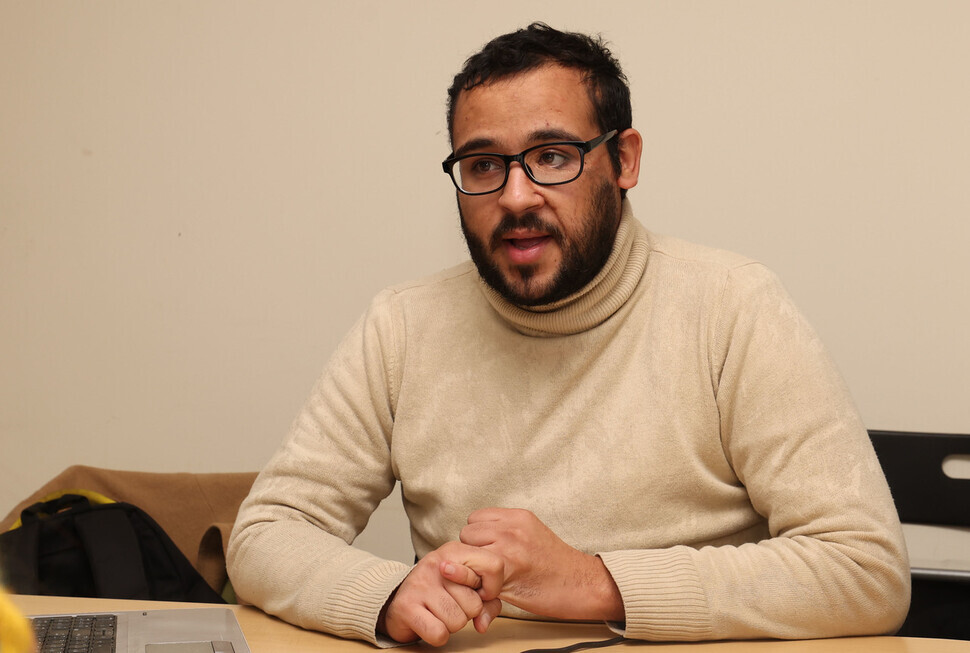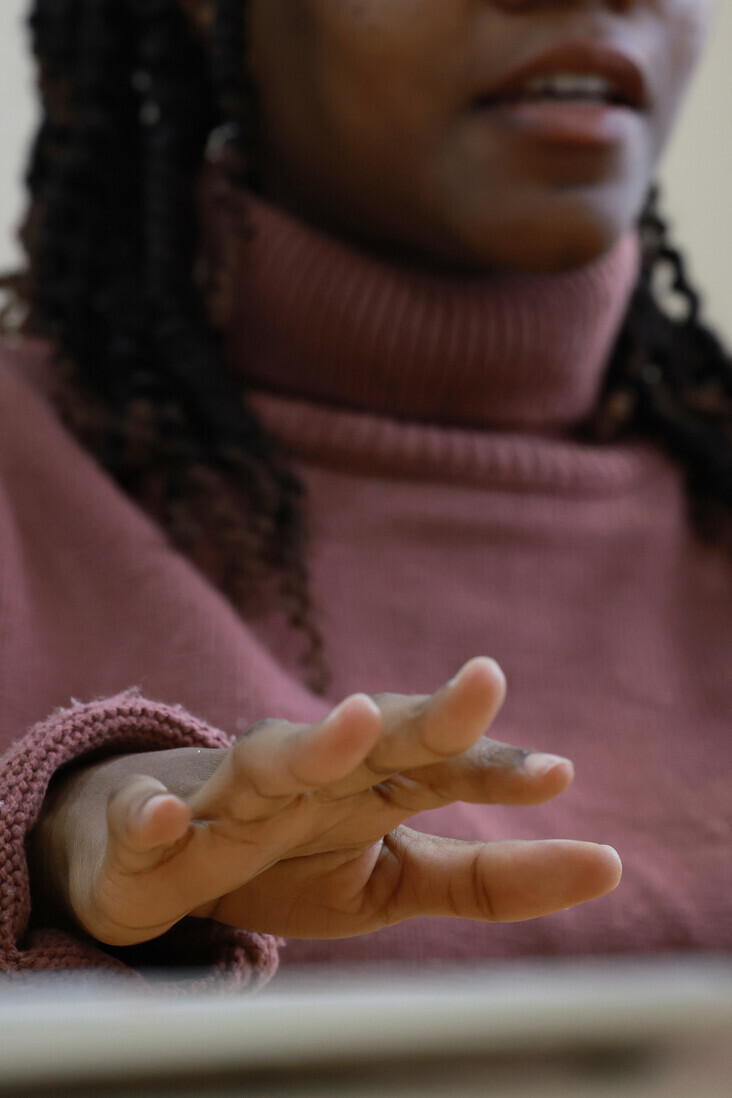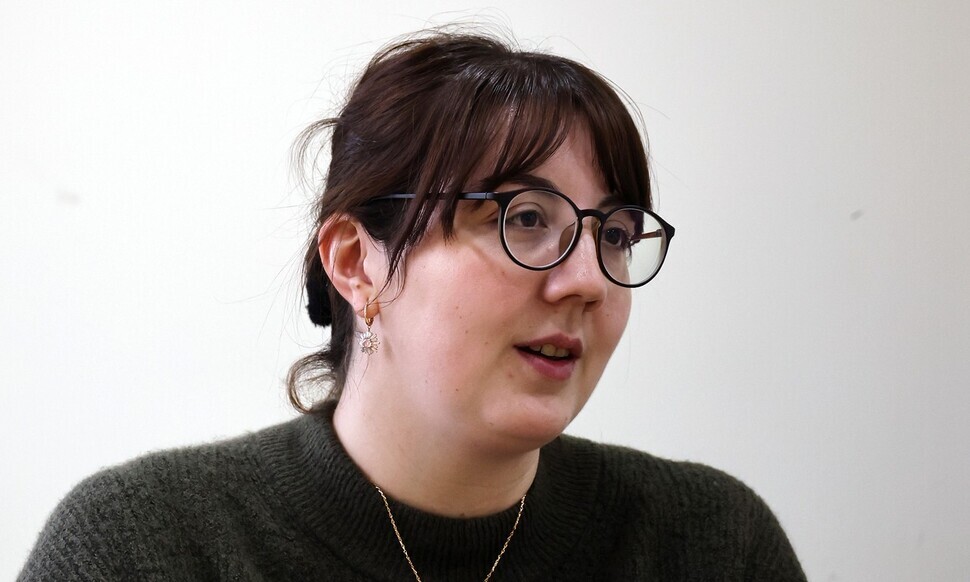hankyoreh
Links to other country sites 다른 나라 사이트 링크
Helplessness, anger fill Palestinians and Israelis in Korea as they watch war back home

Ever since that fateful day, life has changed radically.
“It feels like my whole life has been put on pause,” said 29-year-old Khiriah of the time since war broke out on Oct. 7. She has family back in the Palestinian-administered West Bank.
Two months have passed, but Khiriah spends each day anxiously checking social media and news bulletins about the war on live television.
Liz, a 27-year-old Israeli exchange student, is going through something similar.
“When warnings go off on the border [in Israel], I get an alert on my phone, too. I feel helpless, like there’s nothing I can do,” Liz says.
Another thing these people have in common is they’ve all lost loved ones.
“These twin brothers that went to my high school were abducted, and another guy from my school was killed at the Nova music festival,” said Dana, a 24-year-old Israeli exchange student.
“My old neighborhood was just obliterated. A relative of mine and their fiancé were killed, as well as an entire 12-person family living next door,” said Saleh, a 27-year-old Palestinian refugee from the Gaza Strip.
As of Thursday, it has been two months since the Palestinian militant group Hamas triggered a war with its large-scale surprise attack on Israel. Around 1,200 Israelis were killed in the attack, while 16,248 Palestinians have died, as of Tuesday, in Israel’s retaliatory strikes over the past two months. The world has been horrified by the terrible atrocities committed by both sides.
How are Israelis and Palestinians enduring these tragic events?
From Monday through Wednesday, the Hankyoreh met with two Israelis and two Palestinians in Korea who have family back home and listened to their thoughts. Beyond the current situation, we asked them about the causes of the dispute over Palestine and potential solutions. But there’s no easy way to bridge the deep emotional gap filled with hatred for the other side.
While both Israelis and Palestinians are barely able to sleep at night because of these tragic events, there’s little other common ground between the two sides.
Saleh, a refugee from Gaza, said the human cost of Israel’s brutal attack is too great. There are 2.2 million-2.3 million people packed into the 365 square kilometers of the Gaza Strip, which is just 41 km long and 6-12 km wide.
The Gaza Strip was taken over by Hamas in June 2007. Since then, it has been under blockade by Israel, becoming what’s often called an “open-air prison.”
Given Gaza’s lack of space and economic troubles, it’s common for several generations of six or seven siblings each to share a single house. That’s why “entire families are often wiped out” by Israeli air strikes, Saleh explains.
“My friend Mustafa was one of 17 people killed in one attack alongside his wife, his daughter, his parents and his siblings.”

How did the war begin?
For Liz, an Israeli, it comes down to “Hamas’ selfish anti-Semitism.”
“If Hamas has used the money it gets from the outside for the people of Gaza instead of on tunnels and missiles, [this war] could have been prevented,” she said.
Liz added that the war had been “instigated by Iran” while Israel was on the verge of normalizing relations with Saudi Arabia, the regional powerhouse, after previously restoring relations with Arab states such as the United Arab Emirates, Bahrain and Morocco through the Abraham Accords in 2020.
That suggests that Israel’s mortal enemy of Iran may have been involved in the sneak attack, an opinion shared by Dana.
“Hamas teaches children to hate Israel and Jews,” she said.
“This isn’t a simple territorial dispute,” she said, emphasizing that the conflict is grounded in racial hatred.
The Palestinians’ opinions were the exact opposite of that.
The fundamental cause of the conflict, Khiriah said, is “Israel’s occupation and colonization of Palestinian land” since the establishment of Israel in 1948.
At the time of its founding, Israel drove out the original inhabitants of the land in a tragic series of events that Palestinians refer to as the Nakba, meaning “catastrophe” in Arabic.
For 17 years now, since 2007, Israel has controlled access to electricity, water, food and pharmaceuticals and restricted the freedom of movement into and out of the Gaza Strip.
“I’ve never been able to go to the West Bank or Jerusalem in my entire life,” said Saleh, who was born and raised in the Gaza Strip.
Israel began to erode Palestinian territory over the course of four wars in the Middle East, all of which it won. Israel and Palestine agreed to a “two-state solution” in the Oslo Accords in 1993. Under the accords, the West Bank and the Gaza Strip are supposed to be part of an independent Palestinian state, but Israel has been building more Jewish settlements in the West Bank — an act the international community regards as illegal.
With Israeli and Palestinian communities interspersed throughout the West Bank, there are a total of 188 checkpoints there, some operated by the Israeli military and others by private security firms. (That total includes 49 checkpoints that run around the clock.)
To get from the city of Nablus in the north to Ramallah in the south, for example, Palestinians must pass through these checkpoints. Khiriah said that too many Palestinians had suffered from frivolous arrests during Israel’s occupation, which has lasted for decades now.

Khiriah and Saleh mentioned the killing of Palestinians who had been part of a peaceful series of protests called the Great March of Return in 2018.
“Over 10,000 people were injured and over 600 people were killed. A substantial number of them were children,” Saleh remarked.
“Taking people’s families, their brothers and sisters, robs them of the will to live. You can’t help but think about how to get revenge,” Khiriah said.
The Israelis and Palestinians also disagreed sharply in their views of Hamas.
Dana, an Israeli, described Hamas as being “just a terrorist group like the Islamic State,” with anger rising in her voice.
“I heard on live television that the parents of my school friend had been killed and that my friend had to wait seven hours to be rescued, while lying there in her mother’s blood. It was a terrible shock for me,” she said.
“If Hamas members are ‘freedom fighters,’ why do they use the Palestinians as human shields?”
Once again, Saleh saw things quite differently.
“Hamas was established as part of the Palestinian liberation and resistance movement,” he said.
As for why Hamas fighters had taken Israelis hostage, he said, “I understand they were trying to secure the release of over 6,000 Palestinian detainees” who had been unjustly arrested by Israel.
Khiriah said, “Hamas’ actions have forced Israelis to confront the existence of the Palestinians in their lives. While I don’t agree with all their methods, they do seem to be trying to bring about some kind of change.”
What about Israeli Prime Minister Benjamin Netanyahu, who leads what is considered the most radical right-wing Cabinet that Israel has ever seen?
The Israelis we interviewed seemed to shy away from criticism.
“Until this happened, there were a lot of people who didn’t agree with the government. But recently, I feel like people have been trying to avoid open criticism. We’re too focused on the safe return of the hostages and going back to normal life to take an interest in politics,” Dana said.

Dana and Liz stressed that the Israeli Defense Forces give Gaza Strip residents advance warning about attacks and urge them to evacuate.
The Israeli interviewees also alleged that not only Hamas militants, but also ordinary Palestinian civilians had crossed the security fences and committed various crimes. “The masked people with guns aren’t the only terrorists,” one of them said.
Could this long-running conflict have a solution? The Israeli government’s stated goal in the war is wiping out Hamas and bringing the hostages safely home.
The Israeli interviewees had a similar mindset. Dana said that “our first priority is eliminating the terrorist group that controls the Gaza Strip,” while Liz declared that “all the hostages have to return home, and Hamas has to give up power.”
While all the interviewees were in agreement about the horrible situation in the Gaza Strip, the Israelis blamed that on “Hamas’ tyranny” while the Palestinians blamed it on “Israel’s oppression.”
“Wiping out Hamas is a goal that can’t be achieved. Many of those who join Hamas are those who have lost friends and family members,” Khiriah remarked.
Dana offered a different perspective. “The problem is that rich countries donate a lot of money to the Gaza Strip, but that gets spent on terrorism. Using that money to build schools and water resources and to strengthen the economy would help [resolve the conflict]. It’s all too easy to join a terrorist group when you’re in an awful environment without a decent home or life to lead,” she said.
While the two-state solution is often mentioned as the only viable solution to the Palestinian issue, there seems little chance of that being realized anytime soon.
“The state of Israel should never have been founded,” Khiriah said.
“We need to reclaim our land and our rights,” said Saleh.
Given the decades of repression and suffering they’ve endured, the Palestinians are reluctant to accept the idea of peaceful coexistence with Israel.
According to Khiriah, the two-state solution would “perpetuate Israel’s oppression of Palestine,” adding that “Palestine can only be healed by undoing its colonization.”
The Israeli interviewees were just as pessimistic.
“The UN presented a plan for dividing the land, and the state of Israel was established, but the Arabs didn’t want Israel around. Even now, they don’t want Jews or Israelis living on their land,” Dana said.
“In 2017, Hamas announced that its goal is the elimination of Israel. How could we get along with them? Palestine has no future as long as Hamas is in charge,” Liz said.
By Noh Ji-won, staff reporter
Please direct questions or comments to [english@hani.co.kr]

Editorial・opinion
![[Column] When ‘fairness’ means hate and violence [Column] When ‘fairness’ means hate and violence](https://flexible.img.hani.co.kr/flexible/normal/500/300/imgdb/original/2024/0516/7417158465908824.jpg) [Column] When ‘fairness’ means hate and violence
[Column] When ‘fairness’ means hate and violence![[Editorial] Yoon must stop abusing authority to shield himself from investigation [Editorial] Yoon must stop abusing authority to shield himself from investigation](https://flexible.img.hani.co.kr/flexible/normal/500/300/imgdb/original/2024/0516/4417158464854198.jpg) [Editorial] Yoon must stop abusing authority to shield himself from investigation
[Editorial] Yoon must stop abusing authority to shield himself from investigation- [Column] US troop withdrawal from Korea could be the Acheson Line all over
- [Column] How to win back readers who’ve turned to YouTube for news
- [Column] Welcome to the president’s pity party
- [Editorial] Korea must respond firmly to Japan’s attempt to usurp Line
- [Editorial] Transfers of prosecutors investigating Korea’s first lady send chilling message
- [Column] Will Seoul’s ties with Moscow really recover on their own?
- [Column] Samsung’s ‘lost decade’ and Lee Jae-yong’s mismatched chopsticks
- [Correspondent’s column] The real reason the US is worried about Chinese ‘overcapacity’
Most viewed articles
- 1China calls US tariffs ‘madness,’ warns of full-on trade conflict
- 2[Column] When ‘fairness’ means hate and violence
- 3[Column] US troop withdrawal from Korea could be the Acheson Line all over
- 4Could Korea’s Naver lose control of Line to Japan?
- 5[Editorial] Yoon must stop abusing authority to shield himself from investigation
- 6[Column] How to win back readers who’ve turned to YouTube for news
- 7DongA Ilbo and the government are told to apologize for past civil rights violations
- 8S. Korea’s spy agency ramping up national security investigations to keep itself relevant, critics s
- 9A Korean production studio may have made your favorite show – even if you don’t watch K-dramas
- 10[Column] Samsung’s ‘lost decade’ and Lee Jae-yong’s mismatched chopsticks